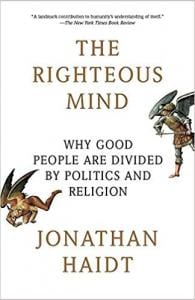How can Jesus tell us to love our neighbor (Luke 10:27), but then tell us to hate our father, mother, spouse, children, brothers, and sisters?
In fact, Jesus tells us to love even our enemies (Luke 6:27). But we’re supposed to hate the people who are closest to us?
This doesn’t seem right, does it? Why would Jesus say this? What’s going on here?

Jonathan Haidt is a moral psychologist who wrote The Righteous Mind: Why Good People Are Divided by Politics and Religion. In the book, he suggests that there are six moral frameworks that people use to determine what’s right and wrong. The way in which we privilege these different frameworks is why people of different political positions often find themselves at odds and talking past each other.
Here are the six moral frameworks:

Fairness/Cheating
Sanctity/Degradation
Loyalty/Betrayal
Authority/Subversion
Care/Harm
Freedom/Oppression
How you decide what is “righteous” or morally acceptable behavior, according to Haidt, is largely determined by the moral frameworks that you consider most important.
We’re going to look at just four of these frameworks for Luke 14:25-33. If we apply Haidt’s theory to this passage, we can see that Jesus is prioritizing Care over Loyalty. He is also privileging Freedom over Authority. Let me explain.
Jesus is very clear that devotion to God is more important than anything else, right?
And, according to his teaching, being devoted God means prioritizing Care for the vulnerable (“the least of these”). It also includes Liberation (freedom from oppressive sin and the forces that dominate people). These are the two primary frameworks for discipleship.
But if a person prioritizes the Loyalty framework, they may think it’s more important to be loyal to one’s family, race, or country. This isn’t necessarily a bad thing. Loyalty is a good quality to have. But if it means harming those outside of one’s clan, that’s a problem. And if you insist that loyalty to these earthly entities is what God requires, Jesus is going to challenge that.
Likewise, if Authority is your primary moral matrix, you’ll think it’s important to obey those who are in a position of power and leadership. Again, respecting authority is a good thing. Unless those in authority are abusing their power. And if they insist that obedience to these earthly powers is what God requires, Jesus is having none of that.
So, do you see how Jesus is putting these moral frameworks in tension with each other in this passage?
He’s saying that to be his disciple, you may have to give up your loyalty to your country, your tribe, your clan – maybe even your own family. If you want to be Jesus’s disciple, you may have to subvert authority for the higher good. You may have to “hate” father and mother, spouse and children, brothers and sisters, yes, and even life itself.
Even life itself? Yes. Jesus knows that those who are all in for the Kingdom of God must be willing to give up even their own life. And if that isn’t bad enough, he also says that you have to give up your possessions. What?! For some of us, that’s a fate worse than death!
Why would Jesus demand giving up possessions?
It’s because our possessions can be used by others to possess us, to keep us under control and away from discipleship. If people are distracted chasing after the next shiny object, keeping up with the Joneses, attaining the newest and coolest item, they won’t have time, energy, or interest in worshiping God and pursuing justice.
Even more pernicious is when powerful people threaten financial ruin in response to people trying to hold them accountable or to follow God’s call. For example, the father who threatens to cut off his son from the family fortune if he decides to become, say, an immigration lawyer. Or the boss threatening to fire the employee who discovers she’s been stealing from the company. Or a country’s leader who warns of national financial catastrophe if he’s impeached and held accountable for his crimes.
Jesus knows that in all these cases, we have to be willing to hate the behaviors that God hates.
And this may mean hating those who stand in the way of God’s justice, or who stand by silently while injustice runs rampant. In other words:
We have to hate the right things in order to love the right things.
Now I know – hate is a strong word. In Greek, the word is miseo, literally, “to hate, to detest.” There’s no finessing its meaning.
But I want to be clear about something. I don’t think that Jesus meant that we should treat our family members with hatred or disrespect. The fourth commandment is unequivocal that we are to honor our family members. And his earlier teaching about loving one another and loving our enemies still stands.
So he’s not talking about being hateful toward others.
Instead, Jesus is saying that following him sometimes means we have to hate the devotion we have to those who keep us from following God. We have to hate the idols we worship in order to love God completely. And this may mean giving up our devotion even to family ties. Especially if family members are unwilling to denounce the evil they see around them (or are engaging in evil behaviors themselves). Or if they are using those ties to keep you from following Jesus’s call on your life.
In other words, if your discipleship isn’t making the people within your family of origin uncomfortable, you may be putting your loyalty to them above the call to follow Jesus.
And if the state, the police, the government, the church leadership, or even your own parents are abusing their power and authority, but you’re not willing to hold them accountable and call for justice, then you are allowing your obedience to earthly powers to supersede your obedience to God.
So, let’s say you do decide you want to follow Jesus – what then?
In verses 28-32 he’s telling us that we’re going to have to figure out what discipleship is going to mean for our lives. Like estimating the costs of a building, you’re going to have to think about what discipleship will cost you. And if you’re prepared to accept this cost of discipleship.

There was a Lutheran pastor and theologian by the name of Dietrich Bonhoeffer who wrote a book with that title: The Cost of Discipleship. He lived and ministered in the 1930s and 40s during the rise of the Third Reich in Germany. Bonhoeffer saw his fellow countrymen and women succumb to the distorted theology of the Nazi regime. The Volk – the mythic ideal of a perfect Aryan race – was to supplant all other concerns. The Loyalty and Authority frameworks were primary for the Reich. They used the family structure to mirror and cement their authoritarian government. And they demanded obedience to the Fuehrer at all costs. Of course, we know the catastrophic result of this ideology – fascism, a cult of personality, the scapegoating of non-Aryan races, genocide, and war.
As Bonhoeffer and a few other clergy watched their country descend into this evil madness, they took a stand against the regime. But this stand cost them dearly. They learned the painful truth of Jesus’s teaching:
“Whoever comes to me and does not hate father and mother, wife and children, brothers and sisters, yes, and even life itself, cannot be my disciple.”
They lost everything. Friends and family members turned against them. They were stripped of their pulpits. They were put on trial. Many of them, including Bonhoeffer, were executed for resisting and trying to overthrow the Nazi regime.
But they did it because they knew it was the right thing to do, the godly thing to do. They knew that being a disciple of Jesus meant that Care and Freedom had to surpass Loyalty and Authority. And they knew one more thing.
They knew that the cross leads to resurrection.
They trusted that God’s love was stronger even than the Fuehrer, even than the Reich, even than death.
It was not just Germany where family members found themselves at odds with each other because of what the government and society was doing. In our own country during the Civil War, families were split over the question of slavery. During the Civil Right Movement, communities were embattled over racial inequality. During the Vietnam War, the nation came to blows over military action.
Now today, our country is divided again over many, many issues.
We find ourselves split over the rights of the LGBTQIA community as well as racial and ethnic injustice. We find ourselves embattled over economic inequality and immigration issues. And we have come to blows over the gun crisis. The tension between the moral frameworks when we try to talk about these issues is so strong, they threaten to tear apart our communities, our families, our nation. Even churches sometimes find themselves caught in the middle and straining to find what I call “the purple zone” within the red-blue divide.
But I wonder if there were some in the crowd that day listening to Jesus say these words who heard something different?
Something more than just a teaching that reveals our spiritual ineptitude and hopeless divisions. I wonder if some in the crowd heard a teaching that is, in fact, liberating and life-giving?
Because there are some people who have followed the path of discipleship and found themselves at odds with their family of origin, their friends, their spouse, their government, and even their house of worship. And there are those who have tried to follow Jesus, but have found themselves held under the thumb of their families, their leaders, their companies, and even their churches.
For those people, what Jesus is saying will be heard with relief.
They already know there is a cost to discipleship. But now they know that Jesus is giving them permission to let go of the people and the things that are holding them back from following God. And they can trust that there is resurrection on the other side of the cross.
Take, for instance, the transgender man whose family has rejected him.
He can let them go and seek family in a different way – people who will accept and love him for who he is. Following Jesus will mean he will have to hate the right things in order to love the right things. He will have to hate the way he has been treated and be willing to die to his life of being closeted and ashamed. But on the other side of that cross is a resurrection of wholeness, the birth of a new person who lives a life of freedom and discipleship.
Or consider the climate activist whose father has rejected her because she refuses to assent to his politics of denial and his business of pollution.
She can let him go and find family in a different way – people who will join her in her struggle to preserve this planet. She will have to hate the right things in order to love the right things. She’ll have to hate the way our global-capitalist-corporate system has commodified and destroyed the Earth. She will have to be willing to die to her possessions and her life of comfort and security. But on the other side of that cross is an ecological resurrection, the birth of a new way of discipleship that honors people and planet.
Then there is the wife whose husband beats her and her children because he says the Bible tells him he can.
She can take her children and seek refuge in a shelter, get a restraining order, and build a life with people who will support her independence and help protect her children. She will have to hate the right things in order to love the right things. She’ll have to hate the way Scripture has been used to justify abusing her and her babies. She will have to be willing to die to the idea that she is not worthy of God’s love and her husband’s respect. But on the other side of that cross is a resurrection of her dignity and self-respect. The birth of a new woman whose life of discipleship will be a model for her children.
Or consider the family whose church was so toxic with dysfunction and discord that they had to leave.
They are free to find a congregation where people will welcome them and allow them to heal. They will have to hate the right things in order to love the right things. They’ll have to hate the way power was abused in their previous church. They will have to be willing to die to their unquestioned loyalty to church leadership. But on the other side of that cross is a resurrection of their faith, the birth of a new church home where they can follow Christ’s call of discipleship.
You, too, may one day be called to consider the cost of discipleship.
You may even being asking yourself now: what has my faith cost me? What am I willing to sacrifice to be a disciple of Jesus?
Am I willing to hate the things that go against God’s Care and Freedom so that I can be a person of compassion and integrity as I strive to follow Jesus?
Where is my ultimate loyalty? What would be the hardest thing for me to let go if my discipleship required sacrifice? What am I holding onto that is keeping me from following Jesus?
Am I willing to hate the right things in order to love the right things?
Following Jesus – I mean really following Jesus – is the hardest thing we will ever have to do. The cost of discipleship is the highest price we will ever have to pay.
But the resurrection of Jesus shows us – it’s worth it. It’s a love worth hating for. It’s a love worth dying for. A love worth living for.

Leah D. Schade is the Assistant Professor of Preaching and Worship at Lexington Theological Seminary in Kentucky. She is the author of Preaching in the Purple Zone: Ministry in the Red-Blue Divide (Rowman & Littlefield, 2019) and Creation-Crisis Preaching: Ecology, Theology, and the Pulpit (Chalice Press, 2015).
Twitter: @LeahSchade
Facebook: https://www.facebook.com/LeahDSchade/
Read also:
A Fiery, Divisive Jesus? Luke 12:49-56 Through a Dialogical Lens
Sometimes Following Jesus Means NOT Being Neutral (Guest Sermon)













